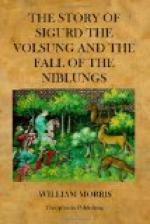“O have thou thanks,”
said Brynhild, “for thine heart that speaketh
kind!
Yea, the hope of my days is
accomplished, and no more there is to
find.”
And again she spake in a space:
“The road hath been weary and long,
But well hast thou ridden
it, Sigurd, and the sons of God are strong.”
He said: “I have
sought, O Brynhild, and found the heart of thine home;
And no man hath asked or holpen,
and all unbidden I come.”
She said: “O welcome
hither! for the heart of the King I knew,
And thine hope that overcometh,
and thy will that nought shall undo.”
“Unbidden I came,”
he answered, “yet it is but a little space
Since I heard thy voice on
the mountain, and thy kind lips cherished
my face.”
She rose from the dark-blue
raiment, and trembling there she stood,
And no word her lips had gotten
that her heart might deem it good:
And his heart went forth to
meet her, yet nought he moved for a while,
Until the God-kin’s
laughter brake blooming from a smile
And he cried: “It
is good, O Brynhild, that we draw exceeding near,
Lest Odin mock Kings’
children that the doom of fate they fear.”
Then forth she stepped from
the high-seat, and forth from the
threshold he came,
Till both their bodies mingling
seemed one glory and the same,
And far o’er all fulfilment
did the souls within them long,
As at breast and at lips of
the faithful the earthly love strained
strong;
And fresh from the deeps of
the summer the breeze across them blew,
But nought of the earth’s
desire, or the lapse of time they knew.
Then apart, but exceeding
nigh, for a little while they stand,
Till Brynhild toucheth her
lord, and taketh his hand in her hand,
And she leadeth him through
the chamber, and sitteth down in her seat;
And him she setteth beside
her, and she saith:
“It
is right and meet
That thou sit in this throne
of my fathers, since thy gift today I
have:
Thou hast given it altogether,
nor aught from me wouldst save;
And thou knowest the tale
of women, how oft it haps on a day
That of such gifts men repent
them, and their lives are cast away.”
He said: “I have
cast it away as the tiller casteth the seed,
That the summer may better
the spring-tide, and the autumn winter’s
need:
For what were the fruit of
our lives if apart they needs must pass,
And men shall say hereafter:
Woe worth the hope that was!”
She said: “That
day shall dawn the best of all earthly days
When we sit, we twain, in
the high-seat in the hall of the people’s
praise:
Or else, what fruit of our
life-days, what fruit of our death shall be?
What fruit, save men’s
remembrance of the grief of thee and me?”




